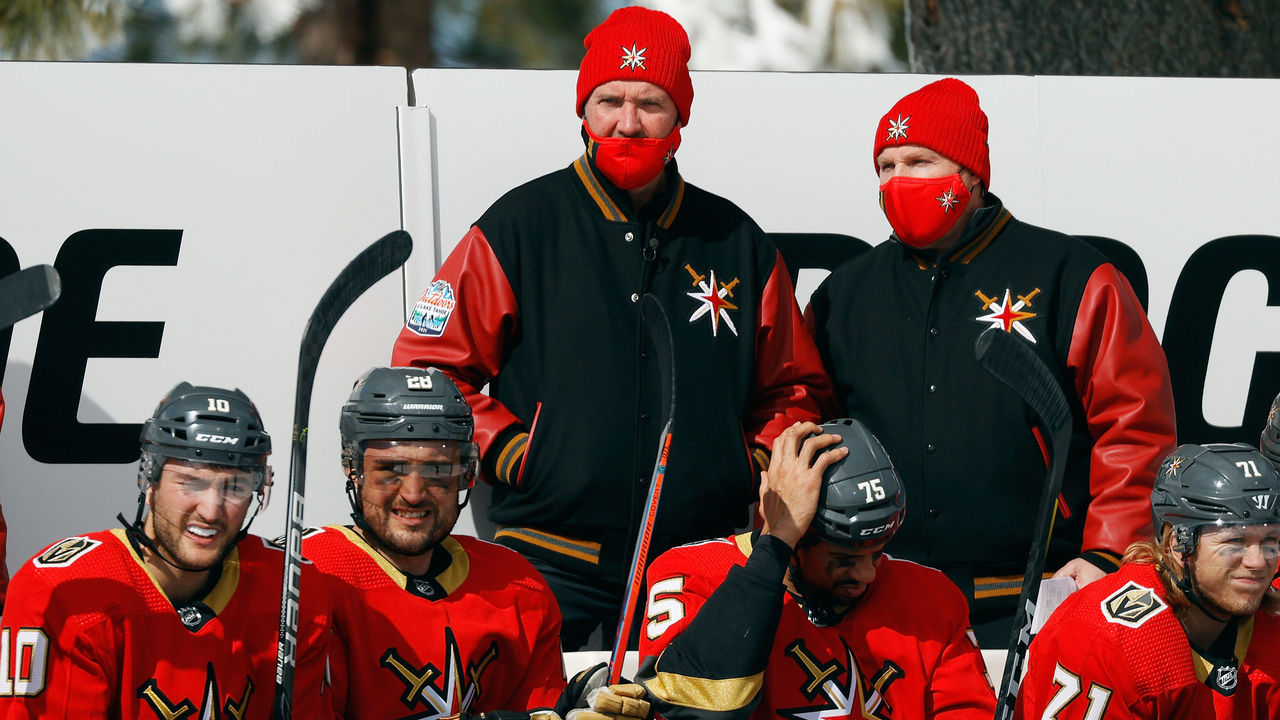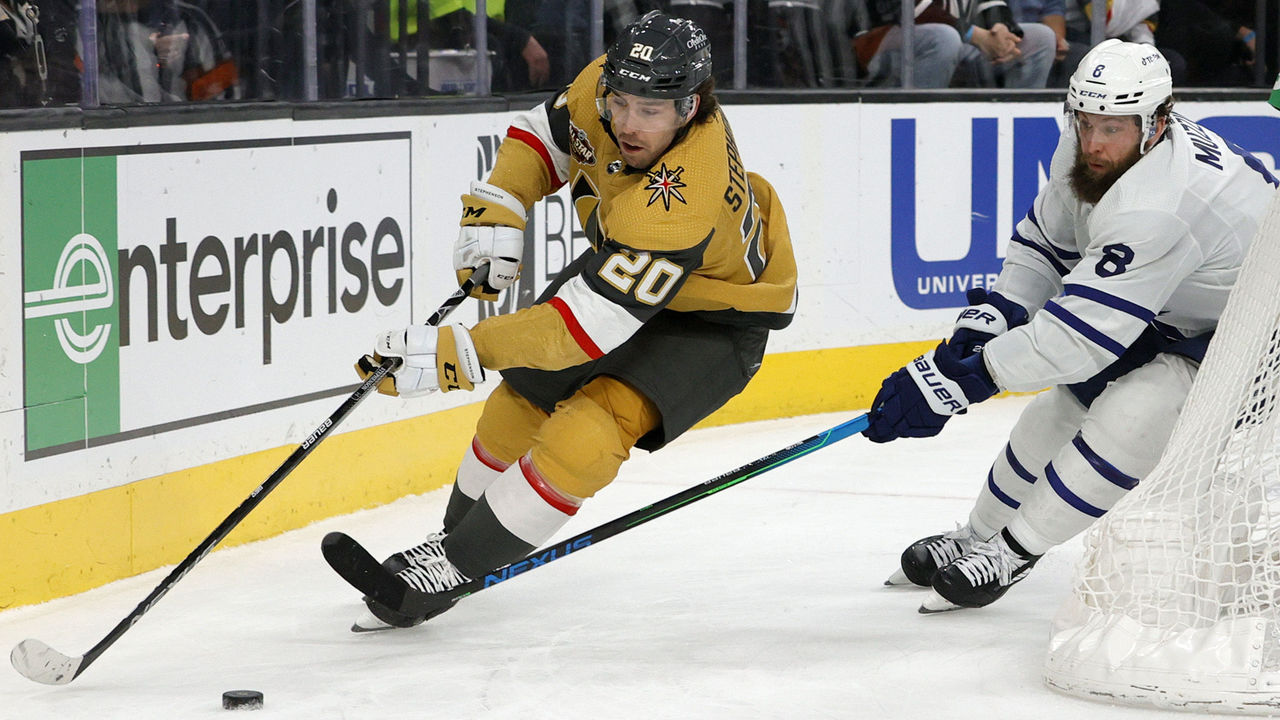DeBoer on Eichel ramping up, Stephenson's growth, and Vegas' resilience
On Thursday, the Golden Knights welcome the Montreal Canadiens to Las Vegas for the final game in what's been a messy first half of the season for the club.
Vegas is first in the Pacific Division with a 23-15-2 record. However, the Knights, a preseason Stanley Cup favorite, rank 13th overall in points percentage. The team has been hammered by misfortune, already losing roughly 250 man-games to injury or illness. Meanwhile, superstar Jack Eichel, acquired from Buffalo in November, has yet to play a single shift for his new club after undergoing his long-awaited surgery.
All of this has forced head coach Pete DeBoer to project Vegas' future.
"We've played well enough without everybody in the lineup that I am optimistic that if we can get to full health here, we have the ability to really find another level," DeBoer said Tuesday in a phone interview with theScore.

DeBoer, 53, has been behind an NHL bench every season since 2008-09. He started in Florida, moved on to New Jersey and then San Jose, and then landed in Vegas two years ago. Only Colorado and Carolina own a better regular-season points percentage than the Knights in the DeBoer era, though both coach and franchise remain locked in on that elusive first Stanley Cup.
We caught up with DeBoer to discuss the state of the Knights and more.
(Note: The following conversation has been lightly edited for clarity.)
You're atop the Pacific Division with a plus-19 goal differential, but this season has been a journey thanks to a long list of injuries and COVID-19 absences. How would you evaluate your club's performance at what's roughly the halfway point of the season?
I'd use the word "resilient" in my evaluation. And I would say I still don't have a good handle on how good we are because of that. I've never had a year where we've had this many man-games lost to injuries. When you throw COVID-19 into it, which has hit us hard, (it hasn't been easy). And we haven't had good timing with it, either. It's been two or three guys every week instead of a large group where you get everybody back (at the same time). It's been a short lineup every night, and I think we've been resilient in our approach and in our ability to survive it.
When I look around the league, there are some teams that, in similar situations, have been buried. I'm looking forward to getting the injuries and COVID in the rearview mirror and seeing down the stretch what our team really has the opportunity to be.
What would you like to see your team improve upon in the second half?
Off the top of my head, we've got to defend better, from our goaltender (starter Robin Lehner has a .904 save percentage) through our team structure. That's what wins in the playoffs. That's what's always been foundational for us. We have to defend our net better. I think special teams can always use improvement. Those would probably be the two areas that jump out to me.
Jack Eichel has arrived. #VegasBorn pic.twitter.com/lECLDaCVhE
— Danny Webster (@DannyWebster21) January 11, 2022
Take me back to November, when general manager Kelly McCrimmon acquired Jack Eichel. How did it all go down from your perspective? What kinds of thoughts ran through your head in those early moments?
I was looped in right from the beginning of the talks about Jack. A deal like that (involving three players, including a superstar, and three draft picks) doesn't get put together overnight. There's a long runway before you finally consummate something like that. I was looped in all along. I knew there was a possibility, but really, until the i's are dotted and the t's are crossed, as a coach, you don't let yourself go there because you don't want to get your hopes up. And there were other teams involved until the end.
When it finally happened and I got that call from Kelly, that's the first time you let your guard down and start thinking about what this guy could mean to our group and the importance of him. Obviously, with what we gave up, I think we all feel that we needed a true No. 1 center and a game-changing-type guy. They're really hard to find, and they're never available in their prime, so we're excited.
As a rival coach, you had an opinion of Jack as a player and person before he arrived in Vegas. I'm curious, now that you've worked with him on the ice and talked off it, what have you learned about Jack?
He's even more impressive once you get to know him. The package of skill and speed and size is really, really something. But, more importantly for me, is his determination to come back and prove to everybody that he's one of the best players in the world. You can feel that in the conversations with him. And that's exciting.
I know you get some version of this question fairly often, but I'll ask it anyway: What's the timeline for Jack's return? When are you expecting to finally plug him into the Golden Knights' lineup?
Well, he's been cleared to rejoin our group, but in a non-contact environment. All along, the time length from the surgeon who did the operation was no contact for at least 12 weeks, or three months. It'll be early-to-mid-February before we hit that threshold. And then, from there, it's really just based on how he's feeling and how comfortable he is, and how long it takes him to get back up to game speed. They said anywhere from three to five months. Obviously, we're hoping it's closer to three, but we don't know where that'll end up.
It's no secret that pieces will have to be moved to fit Jack's contract under the salary cap. The cap situation is what it is, players will be traded, waived, and/or scratched. How do you, as head coach, make sure all of this uncertainty doesn't become a distraction in the dressing room?
You know what, it's almost impossible for it not to be a little bit of a distraction. But it's no bigger of a distraction than the trade deadline, or if your team is in a slump and the rumors start. I think pro players at this level understand the landscape and are trained to deal with that. I don't really see it as an issue. I think, from the organization's perspective, it's a great problem to have - if we can get there - and that's too many healthy, really good players.
Do you feel lucky, in a way, to be a coach working for a management group that's historically been very aggressive with player acquisition? This is far from the first big splash the Knights' front office has made.
It was the single most attractive thing for me when I was speaking to them for the job - their all-in commitment to winning. It started Day 1, when Bill Foley, the owner, said the goal was to have a Stanley Cup within the first six or seven years. Everyone kind of rolled their eyes, but they've been to the Cup Final (in 2018 under former coach Gerard Gallant) and two conference finals (in 2020 and 2021 under DeBoer). We've been knocking on the door, and that's been the mandate since Day 1. A lot of organizations say that's the mandate, but they don't back it up. Here, their actions speak louder than words.

Center Chandler Stephenson leads the team with 37 points in 39 games. The knock on Chandler, at least in the past, has been that he's the beneficiary of great linemates. But there's definitely more to the story. Can you break down exactly what makes Chandler so effective?
One, I think Chandler's answered those questions about linemates this year because he's played with everybody. Mark Stone has missed significant time. Max Pacioretty has missed significant time. Those were his traditional linemates. He's answered those questions from Day 1 of this year with his production and what he's done with everybody (from Evgenii Dadonov to William Carrier to Mattias Janmark). His greatest asset is his speed. He has put-you-on-your-heels type of acceleration and speed. He's got a good competitiveness to him. He also came into the league as a fourth-line player and won a Stanley Cup in Washington, which gives you that foundation of the fourth-line workman-like identity. When you combine that with elite speed and skill, you've got a real good hockey player.
You guys hit the road next week, and the trip out east includes stops in Raleigh for a game against the Hurricanes, Sunrise for a game against the Panthers, and Tampa for a game against the Lightning. Has that three-game stretch become the new California? A gauntlet of sorts?
For sure. And you've seen the teams that have gone through (this) in the last month. There are a lot of O-fers on that trip. (Laughs) We've also got Washington on the front end of it, so it's a real test for us, and I'm excited to see how we respond to it. The last long trip we had out east was (Bruins), Islanders, Rangers, Devils. We ended up sweeping the trip. We're comfortable on the road, but this is a whole different test than anything we've had so far.
All-Star Weekend in Las Vegas is creeping up here. What's something you're looking forward to as not only the coach of the Pacific Division squad, but also as an ambassador for the host city and franchise?
Any time you get to coach in an All-Star Game, it's a great honor and it's a testament to your coaching staff and players, and this year, in particular, our training staff and our medical team. Without them, we wouldn't have been in a position to compete for first place when they decided who would coach in the All-Star Game. The thing I'm looking forward to the most - and I've coached in one before (in 2017 while with the Sharks) - is that it's in our hometown and our home rink and in front of our home fans. That's going to be extra special. The All-Star Game is always about enjoying the experience and making sure your family's around, so we'll try to do both of those things.
One last topic: I wanted to ask you about your longtime friend and coaching rival Paul Maurice. I assume you've touched base with Paul recently. How's he doing? And now that the shock has worn off, what do you make of his resignation from the Winnipeg Jets?
I've had some conversations with him. I check in with him fairly regularly. He's happy. I think the last few years, with COVID protocol and bubbles, have weighed on everybody, and particularly on him. When you combine that with the fact he's been doing this (level of coaching) for 26 years, he had the self-confidence to know what was best for him and his team. I think he's really happy with his choice. He sounds great when I talk to him. He's enjoying family time, which, in this job, you don't get an opportunity to do very often. I don't think he has any regrets.
John Matisz is theScore's senior NHL writer. Follow John on Twitter (@MatiszJohn) or contact him via email (john.matisz@thescore.com).